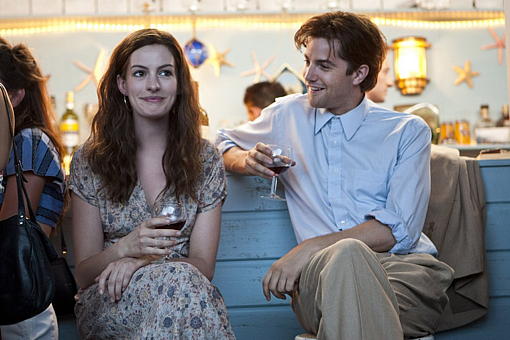By Pam Glazier · August 21, 2011

Sometimes, when you want to tell a big story, one that really hits, you’ve got to get the reveal out of the way first—as soon as possible actually. This is because a surprise reveal can be cheap, and it lessens all the other, smaller moments that should have had a more meaningful spotlight. Such a tactic ensures that the importance of these smaller moments gets overshadowed when they really should be bolstered with added meaning and gravity. This latter effect can be achieved by leading with the big reveal. This gives us the stakes. And even though it might seem to make things anti-climactic, climaxes are not always necessary—especially in stories where it’s about the journey.
One Day features Dexter (Jim Sturgess) and Emma (Anne Hathaway) over the span of two decades, starting with them spending the night together on the evening they graduate from college. We see them once a year on the same date – sometimes they’re together, sometimes not – and we watch these two people over twenty years to discover how they progress through life. They clearly have a bond with each other – across continents, across years – but they cannot seem to fully realize or manifest this bond. Will they ever catch each other? This is what we hope.
The plot seems a little bumbling at times, but I think that is because the movie is following the lives of people who are a bit lost themselves. It doesn’t give us a clear delineation as to why we’re following them, other than the thin through line of “the yearly snap-shot.” This is a little gimmicky, but could have been overlooked if some slight structural changes were made in order to ground the story. So let’s talk a little bit about structure.
As you may have guessed from the opening of this review, there’s a big moment in this story. It’s a shame that the filmmaker’s put it where they did because it would have made everything else matter more if they had just given us the reveal up front. But instead we have to flounder around for meaning until all the moments of the story are finally put into context near the end of the film.
Obviously, one has to choose whether or not front-loading a big reveal is appropriate depending on the specifics of the story being told. But for this particular story, this sort of Shamalan-type reveal didn’t add anything special. It wasn’t a mystery, so there wasn’t really a need to utilize this type of story-device. In fact, it was more distracting than anything else. (And also, can someone please memo the soundtrack people and tell them to stop all the heavy-handed foreshadowing with those painfully obvious music cues? Seriously.)
Another sad misstep occurs with the important sub-plot regarding Dexter’s parents. This sub-plot was steam-rolled. All the hard work that went into these well-built characters was underutilized. It would have made the film stronger and more impacting to show more of them, especially Dexter’s father. But instead, we see a lot about Dexter’s slow decline into drug abuse and assholery. These scenes of Dexter were repetitive and didn’t move the story further along. It could have been quite poetic actually, a sort of cinematic emotional assonance, if Dexter’s parents had been featured a little bit more. This thematic echo is even referenced later in the film, with a bit of heavy handed exposition, without it having really been a part of the story. It’s a shame, really.
Of course, everything looks nice, the cinematography is beautiful. Also, Hathaway and Sturgess are acclaimed actors and, as such, offer decent performances. But they didn’t make the screen sizzle with passion and longing, and they were held back by some of the story problems mentioned earlier. This movie had cuteness and sadness and bleh-ness, but it’s not really worth it.
My recommendation? Skip it and rent one of the greats, like Casablanca or Dr. Zhivago instead.